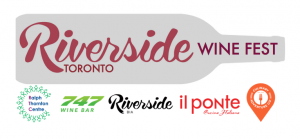“An Apple a day, keeps the doctor away”…so, the saying goes…Maybe we need to change that to…”A Glass of Wine a day!”….Find out more at the FREE Wine & Wellness Seminar on April 13th at OMA Chiropractic -1 Munro Ave (Queen E & Munro) – the kick-off Wine Tasting Event for Riverside WineFEST.
For details and to register visit here:
Just look at these 7 benefits of drinking wine…
- Promotes Longevity
- Reduces Heart-Attack Risk
- Lowers Risk of Heart Disease:
- Reduces Risk of Type 2 Diabetes
- Cuts Risk of Cataracts
- Lowers Risk of Stroke
- Slows Brain Decline
Presenting the seminar is nutritionist Nish Saxena and Chef Scott Savoie of the Culinary Adventure Company. These special guests will pair wines with specific foods to create a nutritional boost! There will be free wine tastings from some of the award winning growers attending the Riverside WineFEST Free Wine Expo on Saturday Apri 18th at the Ralph Thornton Centre.
In addition to award winning wines, One of Riverside’s Favorite Restaurants – Sushi Bar will providing Sushi to complement the Wine Tastings!
This events is also an opportunity to “try and buy” wines from some of Ontario’s finest Wine Growers – many not available at the LCBO.
Sommeliers and Winery Hosts will be on hand to take wine orders and arrange for delivery.
For details and to register visit here:

About Nish Saxena
Registered Dietitian
Sports Nutritionist
About Chef Scott Savoie
Chef Scott’s career has taken him to Portugal and Italy on cooking tours and for several years he was an international private chef specializing in 5 star hunting and fishing lodges in the Canadian North, the American Midwest and New Zealand where he also hosted the “Culture in the Kitchen” radio show. He has cooked for many celebrities including comedian Jeff Foxworthy, NASCAR legend Richard Childress, Dallas Cowboys executive Stephen Jones, and pop singer/songwriter Avril Lavigne to name a few.
In 2010 he put an end to his gypsy ways and made Toronto his home. He founded “The Culinary Adventure Company” to showcase the culinary diversity of Canada’s largest city to locals and visitors alike. The company specializes in food tours, cooking classes, corporate team building events, pop up dinners and tastings, and outdoor activities with a culinary theme such as canoe and beach dining adventures and mushroom forages. It has been ranked the #1 tour company in the city by Trip Advisor since August 2011.
Chef Scott is a member of the International Association of Culinary Professionals, Slow Food, Culinary Historians of Canada and the Mycological Society of Toronto. He also puts a high priority on giving back to the community and frequently donates his time to numerous charity events and causes to benefit the community. He is affectionately referred to as “Toronto’s Unofficial Culinary Ambassador” by those close to him.
*******
- *Research to support the benefits: Source: http://www.foodandwine.com/articles/8-health-benefits-of-drinking-wineThe Benefit: Promotes LongevityThe Evidence: Wine drinkers have a 34 percent lower mortality rate than beer or spirits drinkers. Source: a Finnish study of 2,468 men over a 29-year period, published in the Journals of Gerontology, 2007.The Benefit: Reduces Heart-Attack Risk
The Evidence: Moderate drinkers suffering from high blood pressure are 30 percent less likely to have a heart attack than nondrinkers. Source: a 16-year Harvard School of Public Health study of 11,711 men, published in the Annals of Internal Medicine, 2007.
The Benefit: Lowers Risk of Heart Disease
The Evidence: Red-wine tannins contain procyanidins, which protect against heart disease. Wines from Sardinia and southwest France have more procyanidins than other wines. Source: a study at Queen Mary University in London, published in Nature, 2006.
The Benefit: Reduces Risk of Type 2 Diabetes
The Evidence: Moderate drinkers have 30 percent less risk than nondrinkers of developing type 2 diabetes. Source: research on 369,862 individuals studied over an average of 12 years each, at Amsterdam’s VU University Medical Center, published in Diabetes Care, 2005.
The Benefit: Lowers Risk of Stroke
The Evidence: The possibility of suffering a blood clotrelated stroke drops by about 50 percent in people who consume moderate amounts of alcohol. Source: a Columbia University study of 3,176 individuals over an eight-year period, published in Stroke, 2006.
The Benefit: Cuts Risk of Cataracts
The Evidence: Moderate drinkers are 32 percent less likely to get cataracts than nondrinkers; those who consume wine are 43 percent less likely to develop cataracts than those drinking mainly beer. Source: a study of 1,379 individuals in Iceland, published in Nature, 2003.
The Benefit: Cuts Risk of Colon Cancer
The Evidence: Moderate consumption of wine (especially red) cuts the risk of colon cancer by 45 percent. Source: a Stony Brook University study of 2,291 individuals over a four-year period, published in the American Journal of Gastroenterology, 2005.
The Benefit: Slows Brain Decline
The Evidence: Brain function declines at a markedly faster rate in nondrinkers than in moderate drinkers. Source: a Columbia University study of 1,416 people, published in Neuroepidemiology, 2006.


